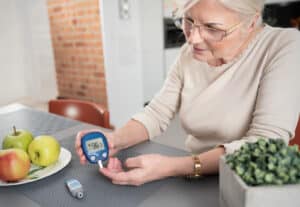
Diabetes is a common condition among older adults, affecting their daily lives and overall well-being. Managing blood sugar levels, staying active, and maintaining a healthy diet can become more challenging with age. For many seniors, personal care at home provides the extra support needed to maintain their health while continuing to live independently.
Diabetes in Seniors: Understanding the Numbers
Diabetes is a significant concern for older adults. According to the Centers for Disease Control and Prevention (CDC), nearly 30% of adults aged 65 and older have diabetes, and many more are at risk due to prediabetes. As people age, the body’s ability to use insulin efficiently decreases, making it harder to regulate blood sugar levels.
Managing diabetes is critical for preventing complications such as heart disease, kidney issues, and nerve damage. Seniors with diabetes often require assistance with monitoring their blood sugar, taking medications, and maintaining a healthy lifestyle—all of which can be supported through personal care at home.
Risk Factors for Diabetes in Seniors
Several factors contribute to the risk of developing diabetes later in life, including:
- Genetics – A family history of diabetes increases the likelihood of developing the condition.
- Obesity – Excess weight, particularly around the abdomen, is linked to insulin resistance.
- Inactivity – A sedentary lifestyle reduces the body’s ability to regulate blood sugar effectively.
- Diet – High sugar and processed food consumption can contribute to diabetes.
- Certain Medications – Some prescriptions for other conditions can affect insulin sensitivity.
For seniors already diagnosed with diabetes, managing these risk factors is key to staying healthy.
Common Side Effects of Diabetes in Seniors
Living with diabetes can lead to various complications, including:
- Vision Problems – High blood sugar can damage the blood vessels in the eyes, leading to conditions like diabetic retinopathy and blindness.
- Nerve Damage – Many seniors with diabetes experience tingling or numbness in their hands and feet, which can lead to serious injuries if left untreated.
- Kidney Disease – Diabetes is one of the leading causes of kidney failure, requiring careful management of diet and hydration.
- Slow Healing – Minor cuts or wounds can take longer to heal, increasing the risk of infection.
- Increased Fall Risk – Fluctuating blood sugar levels can cause dizziness, making falls more likely.
Given these risks, having reliable support at home can make a significant difference in managing diabetes safely.
How Personal Care at Home Helps Seniors with Diabetes
For seniors with diabetes, having assistance with daily tasks can improve their health and overall quality of life. Personal care at home provides essential support in key areas:
1. Meal Preparation and Nutrition
Proper nutrition is crucial for managing diabetes. Caregivers can help plan and prepare balanced meals that align with dietary needs, focusing on whole grains, lean proteins, and fresh vegetables while limiting processed sugars and carbohydrates.
2. Medication Reminders
Managing diabetes often requires multiple medications, including insulin or oral drugs. A caregiver can provide reminders to ensure seniors take their medications on time, reducing the risk of complications from missed doses.
3. Blood Sugar Monitoring Support
While caregivers cannot administer medical treatments, they can assist seniors in checking their blood sugar levels and recognizing signs of high or low blood sugar, ensuring that they follow their doctor’s recommendations.
4. Encouraging Physical Activity
Staying active helps regulate blood sugar and maintain overall health. A caregiver can provide companionship for short walks, light exercise, or mobility assistance to keep seniors engaged in physical activity safely.
5. Preventing Falls and Complications
For seniors experiencing diabetes-related nerve damage or vision issues, fall prevention is essential. A caregiver can help create a safe living environment by assisting with mobility, reducing trip hazards, and supporting wound care if necessary.
Provident Home Care Offers Compassionate Diabetes Support
At Provident Home Care, we understand the unique challenges that come with managing diabetes in older adults. Our caregivers provide personalized support, from meal preparation and medication reminders to assistance with daily routines. With personal care at home, seniors can maintain their independence while receiving the help they need to manage their condition safely.
For more information on how Provident Home Care supports seniors with diabetes, visit our website.
If you or an aging loved one are considering personal care at home in Concord, CA, please contact the caring staff at Provident Care Home Care today at (209) 578-1210.
- Provident Care Team – Bosses Day 2025 Tribute - May 6, 2025
- Five Activities Involving Music That Seniors Can Enjoy - May 2, 2025
- Simple Ways to Show You Care During Older Americans Month - April 25, 2025



